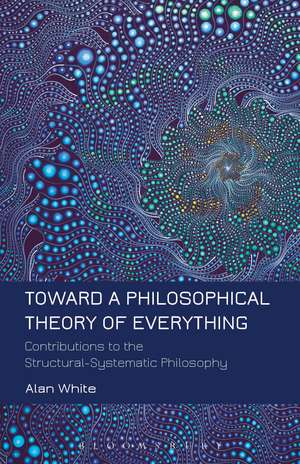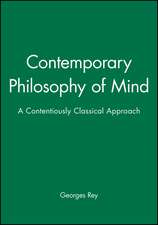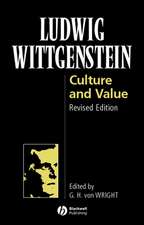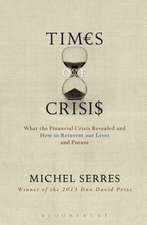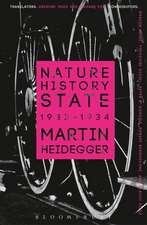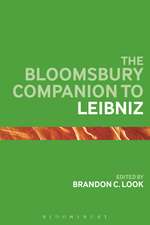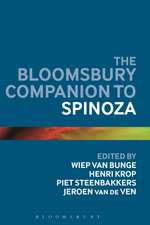Toward a Philosophical Theory of Everything: Contributions to the Structural-Systematic Philosophy
Autor Professor Alan Whiteen Limba Engleză Paperback – 26 mar 2014
| Toate formatele și edițiile | Preț | Express |
|---|---|---|
| Paperback (1) | 190.06 lei 3-5 săpt. | |
| Bloomsbury Publishing – 26 mar 2014 | 190.06 lei 3-5 săpt. | |
| Hardback (1) | 829.82 lei 6-8 săpt. | |
| Bloomsbury Publishing – 26 mar 2014 | 829.82 lei 6-8 săpt. |
Preț: 190.06 lei
Preț vechi: 221.76 lei
-14% Nou
Puncte Express: 285
Preț estimativ în valută:
36.37€ • 37.97$ • 30.10£
36.37€ • 37.97$ • 30.10£
Carte disponibilă
Livrare economică 14-28 martie
Preluare comenzi: 021 569.72.76
Specificații
ISBN-13: 9781623567187
ISBN-10: 1623567181
Pagini: 208
Dimensiuni: 140 x 216 x 25 mm
Greutate: 0.27 kg
Editura: Bloomsbury Publishing
Colecția Bloomsbury Academic
Locul publicării:New York, United States
ISBN-10: 1623567181
Pagini: 208
Dimensiuni: 140 x 216 x 25 mm
Greutate: 0.27 kg
Editura: Bloomsbury Publishing
Colecția Bloomsbury Academic
Locul publicării:New York, United States
Caracteristici
Argues that philosophy should be freed from its current fragmentation into epistemology, metaphysics, ethics, and so on.
Notă biografică
Alan White is the Mark Hopkins Professor of Philosophy at Williams College, USA.
Cuprins
AcknowledgmentsForeword, by Lorenz B. Puntel Chapter 1. Preliminaries 1.1 An initial clarification of this book's subtitle 1.2 An initial clarification of this book's title 1.3 Preliminary remarks on methodology 1.4 A philosophically consequent stylistic peculiarity 1.5 The structure of this bookChapter 2. Theoretical frameworks 2.1 "Theoretical framework 2.2 The SSP as a network 2.3 Seven central theses concerning theoretical frameworks 2.4 A family of theoretical frameworks rejected by the SSRPP 2.5 The SSP's abstract theoretical framework 2.6 Concretizing the SSP's theoretical frameworkChapter 3. Truth 3.1 The task 3.2 Substantialism and deflationism 3.3 The basic error behind all deflationary theories of truth 3.4 The truth term 3.5 It is true that . . . if and only if Chapter 4. Knowledge 4.1 The inadequacy of the definition of knowledge as justified true belief 4.2 The SSP's definition of knowledge 4.3 False knowledge Chapter 5. Theoreticity, practicity, affectivity 5.1 Modes of engagement 5.2 Theoretical, practical, and aesthetic values 5.3 Sentences and operators Chapter 6. Human freedom 6.1 Terminological clarifications 6.2 Adding a theory of freedom to the SSP 6.3 A theory of freedom for the SSP 6.4 Human freedom and systematic philosophy Chapter 7. Beauty 7.1 Callological delight 7.2 Complex callological delight 7.3 Callological delight and beauty 7.4 Callological delight and callological evaluation 7.5 All factings are beautiful 7.6 Degrees of beauty 7.7 Ugliness 7.8 Callological disagreement Chapter 8. Being 8.1 Articulating being 8.2 Theories of being and theories of be-ers 8.3 Central aspects of the SSP's theory of being Works cited Index
Recenzii
To read this book is to feel oneself liberated from some of philosophy's oldest dogmas. Rejecting the view that systematic philosophy has to provide unchangeable truth, White undertakes a "theory of everything" which aspires instead to be the best available. In so doing he connects many dotsthat have long needed connecting, from the ontology of propositions to the purpose of religion. He does this speedily, yet without haste; clearly, yet without simplification. Whether or not one agrees with all details of his presentation, Toward a Philosophical Theory of Everything clearly points philosophy into a new and different future.
While the term 'theory of everything' is usually associated with contemporary physics, this book shows that such a theory properly pertains to philosophy. Indeed, the author convincingly argues that no theory presented by contemporary physics could really be a 'theory of everything' since contemporary physics has as its subject matter a restricted universe of discourse. Conversely, philosophy is a strictly theoretical endeavor whose subject matter is the unrestricted universe of discourse. And since the unrestricted universe of discourse includes everything, a philosophical theory whose subject matter is the unrestricted universe of discourse is a philosophical theory of everything. The range of philosophical topics the author addresses in this book is impressive; topics which are both of great philosophical importance and of deep human concern.
Though painstaking in his attention to salient details and sharply focused on the intricacies of meaning, evidence, and argumentation, there is nothing at all scholastic or self-enclosed about the manner in which the author explores topics of fundamental philosophical significance and, more often than not, of deep human import. One of the strengths of this work (and there are many) is that this "theory" exposes and indeed explodes the pretentions of scientism. A first-rate contribution to the speculative tradition of philosophical thought.
Alan White has provided an accessible and yet rigorous and compelling introduction to structural-systematic philosophy. Structural-systematic philosophy takes full account of key insights from analytic philosophy, continental philosophy, and modern science, but because it does not limit itself to any particular mode of discourse, it can convincingly claim to be a "philosophical theory of everything." Clearly presented and tightly argued, this book is a must-read for anyone interested in systematic philosophy.
TAPTOE opens philosophical inquiry to 'everything' by not restricting the universe of discourse in the quest for comprehensive knowledge. The critiques of philosophical views on truth, knowledge, freedom, beauty, being, and God are carefully argued, and the discussions engage with current literature...This is a critically important work for all those deeply interested in philosophical issues and their significance for basic human concerns. Useful index. Summing Up: Highly recommended.
On the one hand, TAPTOE can be read as a primer offering a 'clear and concise introduction' to the structural systemic philosophy (SSP). On the other hand, it supplements and advances themes mentioned in Puntel's texts that require further elaboration and concretization, such as human freedom and beauty. In both aspects White presents to the reader a lucid, compelling theory of being that overcomes the shortcomings of other available frameworks.
While the term 'theory of everything' is usually associated with contemporary physics, this book shows that such a theory properly pertains to philosophy. Indeed, the author convincingly argues that no theory presented by contemporary physics could really be a 'theory of everything' since contemporary physics has as its subject matter a restricted universe of discourse. Conversely, philosophy is a strictly theoretical endeavor whose subject matter is the unrestricted universe of discourse. And since the unrestricted universe of discourse includes everything, a philosophical theory whose subject matter is the unrestricted universe of discourse is a philosophical theory of everything. The range of philosophical topics the author addresses in this book is impressive; topics which are both of great philosophical importance and of deep human concern.
Though painstaking in his attention to salient details and sharply focused on the intricacies of meaning, evidence, and argumentation, there is nothing at all scholastic or self-enclosed about the manner in which the author explores topics of fundamental philosophical significance and, more often than not, of deep human import. One of the strengths of this work (and there are many) is that this "theory" exposes and indeed explodes the pretentions of scientism. A first-rate contribution to the speculative tradition of philosophical thought.
Alan White has provided an accessible and yet rigorous and compelling introduction to structural-systematic philosophy. Structural-systematic philosophy takes full account of key insights from analytic philosophy, continental philosophy, and modern science, but because it does not limit itself to any particular mode of discourse, it can convincingly claim to be a "philosophical theory of everything." Clearly presented and tightly argued, this book is a must-read for anyone interested in systematic philosophy.
TAPTOE opens philosophical inquiry to 'everything' by not restricting the universe of discourse in the quest for comprehensive knowledge. The critiques of philosophical views on truth, knowledge, freedom, beauty, being, and God are carefully argued, and the discussions engage with current literature...This is a critically important work for all those deeply interested in philosophical issues and their significance for basic human concerns. Useful index. Summing Up: Highly recommended.
On the one hand, TAPTOE can be read as a primer offering a 'clear and concise introduction' to the structural systemic philosophy (SSP). On the other hand, it supplements and advances themes mentioned in Puntel's texts that require further elaboration and concretization, such as human freedom and beauty. In both aspects White presents to the reader a lucid, compelling theory of being that overcomes the shortcomings of other available frameworks.
